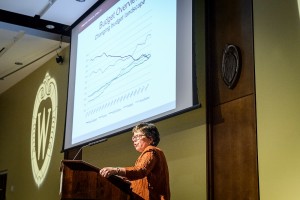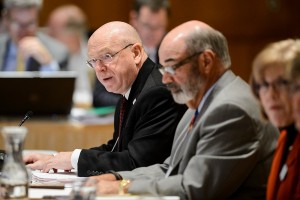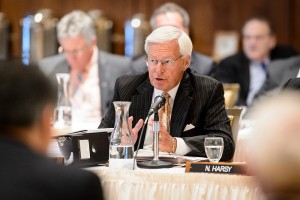
UW-Madison Chancellor Rebecca Blank speaks about the potential impact of proposed cuts to state budget funding during a meeting with members of the UW System Board of Regents in Varsity Hall inside Union South at UW-Madison. (Photo by Bryce Richter / UW-Madison)
MADISON – The Governor’s proposed biennial state budget offers new identity and opportunity for the University of Wisconsin System, UW System President Ray Cross told the Board of Regents Thursday. It also presents serious and significant challenges.
As spelled out by the Governor earlier this week, the budget includes proposals to provide the university with public authority status and a new dedicated funding source. It also included a proposed $300 million cut in funding over the 2015-17 biennium.
“In my opinion, in this state and at this time, a UW System authority is the best model to govern and deliver a public university committed to the core principles of academic excellence, access, responsiveness, and affordability for our students, parents, and taxpayers,” Cross said.
That authority along with a proposed dedicated funding source should enable the university to manage operations more efficiently with greater long-term cost savings, and make tuition more stable and predictable.
At the same time, Cross said, the proposed cuts are “a serious and critical challenge.”
Cross noted that while the tuition freeze substantially limits the university’s ability to make adjustments, “We have a responsibility to try and take this on, and deal with it responsibly and rationally. We also have the responsibility to try and mitigate the impact of these cuts.”
He acknowledged that there are still many areas where questions remain and much analysis needs to be done. Cross said System and institutional leaders will be closely assessing the impact of the proposed cuts and will present their findings at the March Board of Regents meeting.

UW System President Ray Cross holds a discussion about the potential impact of the proposed cuts. (Photo by Bryce Richter / UW-Madison)
The Regents engaged in a lengthy discussion of the budget proposal and its ramifications.
Regent Mark Bradley said the Board has a duty to advocate for the best interests of public higher education in Wisconsin by participating in the narrative with facts and analysis.
Regent Tim Higgins reminded colleagues that legislators and the Governor are also dealing with obligations and difficult decisions in the challenging economic situation. “We have to work in a collaborative process to determine what works best for the citizens of Wisconsin,” he said.
Chancellor Blank addresses the Board
Host chancellor Rebecca Blank of UW-Madison told Regents that a proposed $300 million cut in state support for the UW System would reduce student programming, lead to job lapses and layoffs, and reduce financial aid and access to the university.
“The cuts are too large,” said Blank. “They are too large for our university, and they are too large for the state.”

Regent Gerald Whitburn makes a comment during the Board of Regents’ discussion. (Photo by Bryce Richter / UW-Madison)
Blank said a cut of the magnitude proposed would leave a $91 million budget hole at UW-Madison in the next year – including $57 million in general purpose revenue, $6 million in loss of state support for the Wisconsin Bioenergy Initiative and municipal service payments, a $23 million reduction in continuing costs that were covered in the current year by reserve funds, and an expected $5 million in expected costs to retain the best faculty and staff.
She said the budget hole facing the UW in the coming year is the equivalent of eliminating 650 faculty positions or 1,083 staff positions. “I don’t know how I am going to cope with these cuts come July 1,” she said, adding that the cut is the largest decline in state dollars in university history.
- See the UW-Madison Powerpoint, “Opportunities & Challenges at UW-Madison.”
Blank noted that while Wisconsin is considering cuts to higher education, other states are putting more resources into higher education.
“This is a time to invest and grow and continue to build,” Blank said. “I can promise you our competitors are not standing still.”
“We have a legacy of service to this state and this nation, and I want to build on that,” Blank said.
System’s program array reviewed
The UW System’s program array – with 1,224 degree programs in 2013-14 – is slightly lower than it was at about the time of merger (1,252 degree programs in 1974-75). Current enrollment, however, is 29% higher than 40 years ago, according to Associate Vice President Stephen Kolison, Jr.
As part of the annual report on program planning and review activities, Kolison noted that 60% of the program array is devoted to undergraduate education. Further, he pointed out that STEM (science, technology, engineering, mathematics) programs account for more than a quarter of the entire academic degree array. Business- and health-related programs each account for 9%.
- See
In other actions:
- The Research, Economic Development, and Innovation (REDI) Committee honored and presented award certificates to the inaugural five recipients of Regent Scholar grants (see the Jan. 20 UW System news release);
- The Capital Planning & Budget Committee approved UW System’s request for seven All Agency Maintenance and Repair projects with an estimated total cost of $11.7 million at four campuses. These projects focus on programmatic renovation, infrastructure upgrades, and energy conservation;
- The Business and Finance Committee approved a UW-Madison research agreement with Smithfield Foods, Inc. The most recent amendment extends the project through June 30, 2017, and brings the total expected to be generated for the institution to $670,795;
- The Business and Finance Committee approved an amendment to a UW-Madison Athletics contractual agreement for marketing and multi-media rights with Learfield Communications. The Division of Intercollegiate Athletics at UW-Madison intends to add a high-speed Wi-Fi network and a stadium-wide Internet Protocol Television (IPTV) system within select sports venues;
- The Business and Finance Committee approved a UW-Milwaukee cooperative research agreement with NanoAffix, LLC, A.O. Smith, Badger Meter, Inc., and Baker Manufacturing. The project term runs from August 2014 through July 2017 and is expected to generate $750,000 in revenue to the institution plus $350,000 in in-kind personnel support from partners. These amounts are in addition to $800,000 the institution will receive from an NSF partnership program;
- The Business and Finance Committee approved a research agreement with Areva Mines and NAGRA for the development of two probes for the detection of certain chemical elements. The term of the agreement runs August 2012 through March 15, 2015 and is expected to generate $714,000 for the institution;
- The Business and Finance Committee approved a research agreement with CalciGenix, LLC. The agreement runs June 2014 through June 2017 and is expected to generate $504,000 based on the current agreement;
- The Business and Finance Committee approved the application of the Veterans Access, Choice, and Accountability Act of 2014 within the UW System. This act requires that eligible non-resident U.S. veterans and other eligible benefit recipients be charged the same tuition rates as Wisconsin residents for pursuing the same course or program effective July 1, 2015;
- The Education Committee approved proposed revisions to the UW-Superior Faculty Personnel Rules relating to UWS chapter 3 of the Faculty Unclassified Staff Handbook and the addition of UWS Chapter 7, Dismissal of Faculty in Special Cases, and UWS Chapter 8, Unclassified Staff Code of Ethics to the UW-Superior Unclassified Staff Handbook.
- The Education Committee approved a UW-Milwaukee charter contract with La Casa de Esperanza, Inc., to operate a charter school to be located in the City of Waukesha.
- The Education Committee approved the proposed renewal of the existing UWM charter school contract with Milwaukee Scholars Charter School, Inc., to operate the Milwaukee Scholars Charter School in the City of Milwaukee; and
- The Education Committee approved UW-Superior’s proposed changes to its mission statement.
###
The UW System Board of Regents will resume its meeting at 9 a.m., Friday, Feb. 6, 2015,
at Union South, UW-Madison
